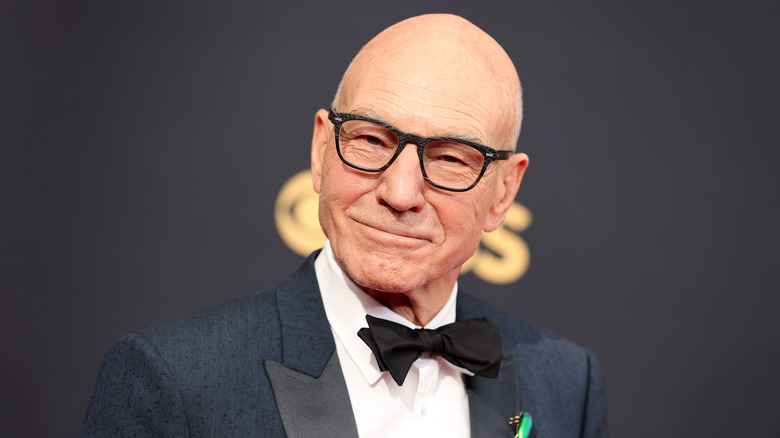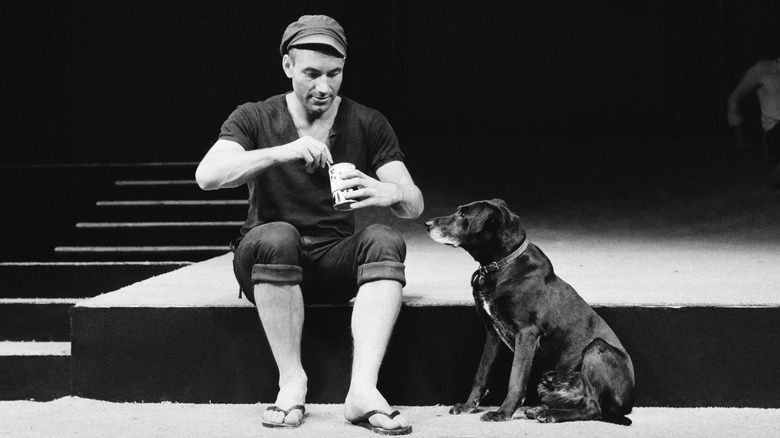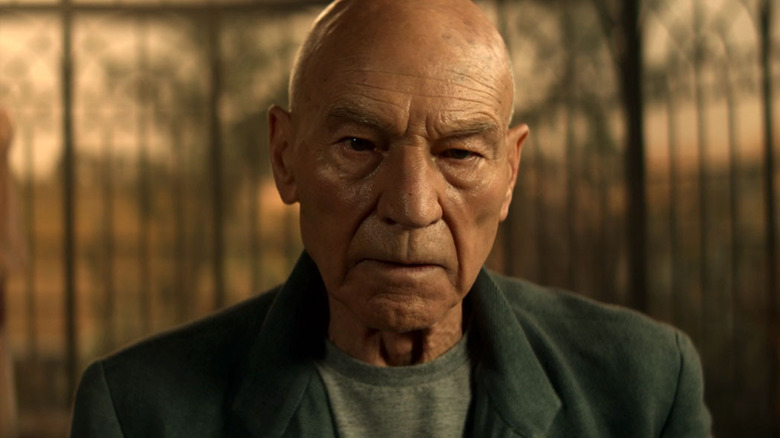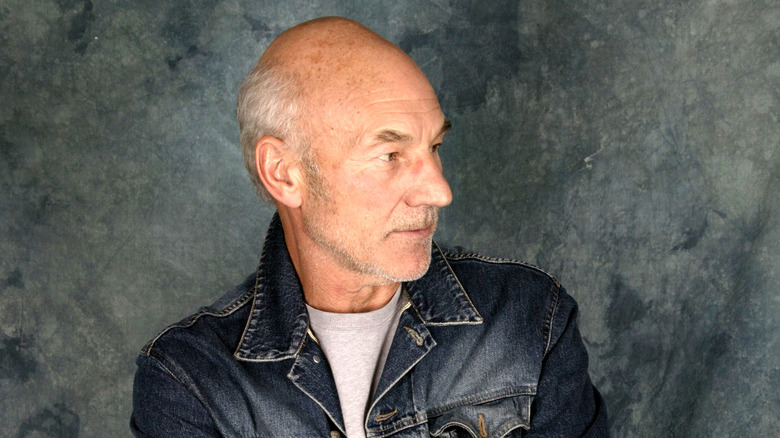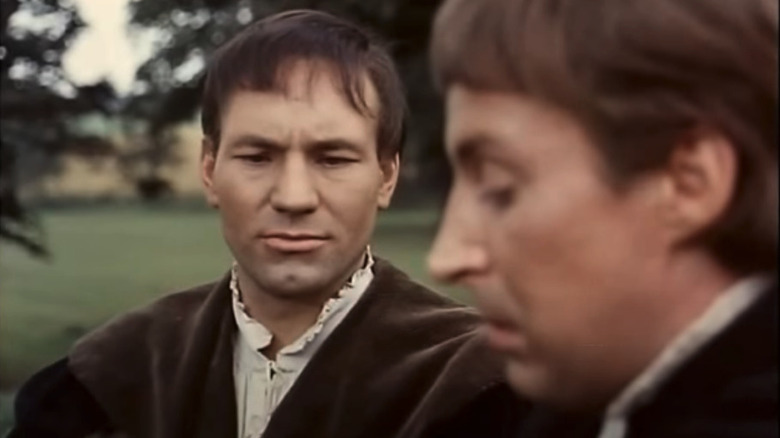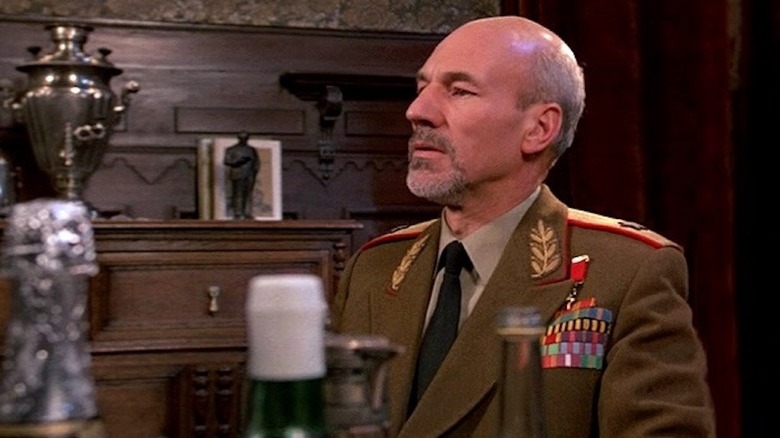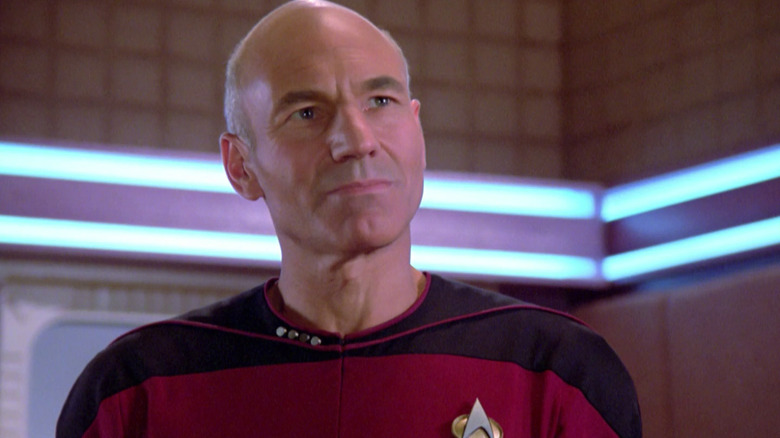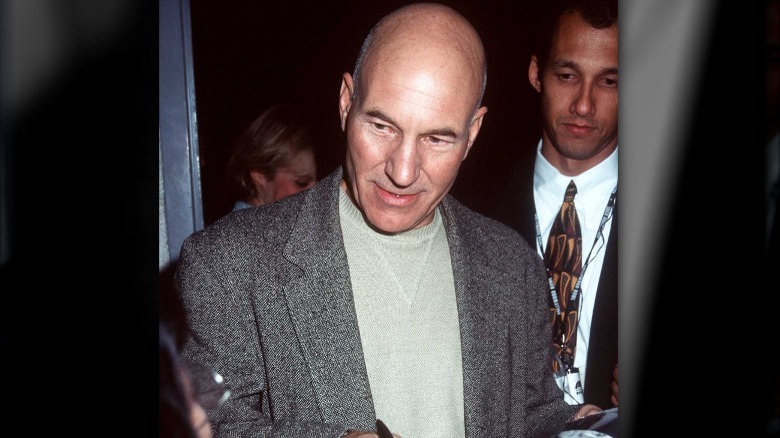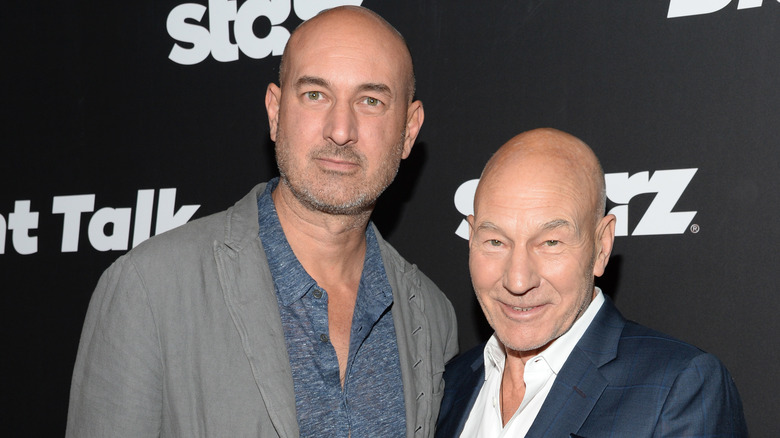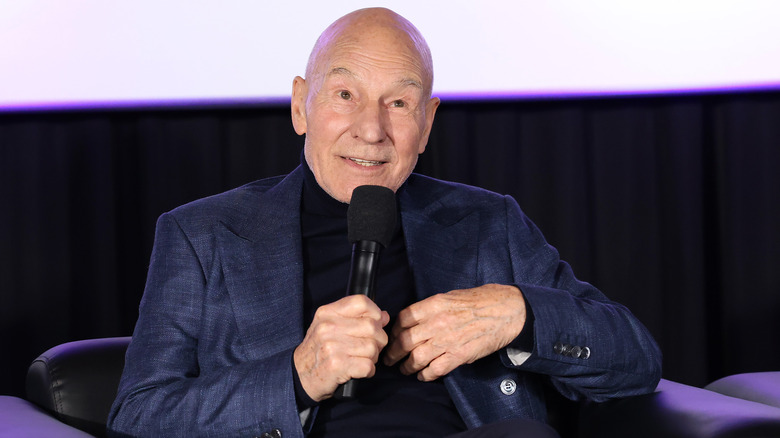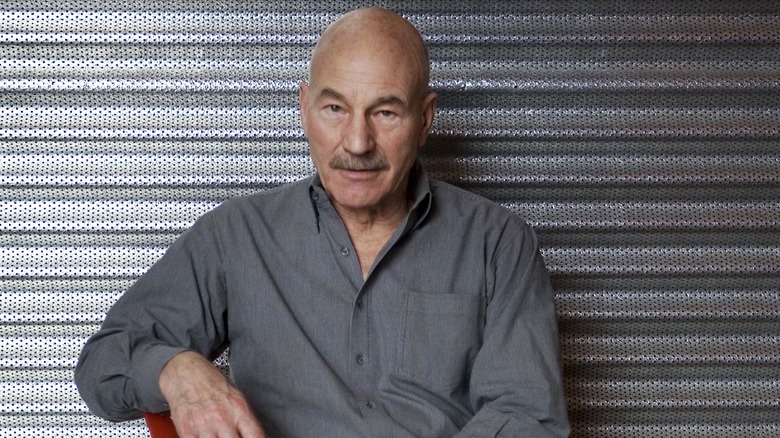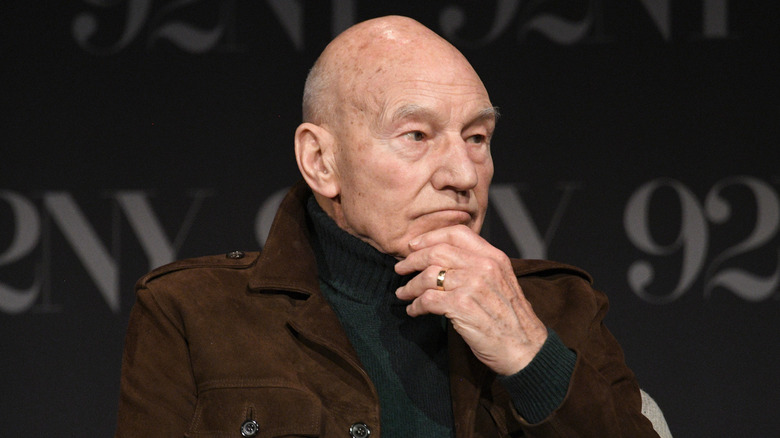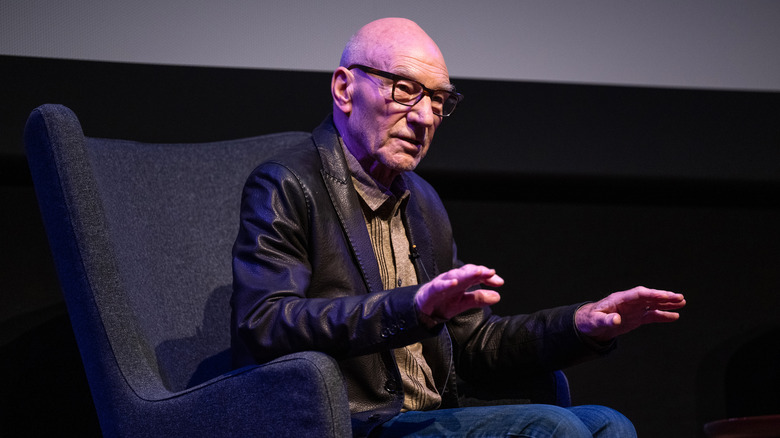The Tragic True Life Story Of Patrick Stewart
In 2020, Patrick Stewart added his name to the growing list of superstar actors who returned to their most iconic roles when he headlined "Star Trek: Picard." Two years later he did it again, reprising his role as Professor Xavier in "Doctor Strange in the Multiverse of Madness." In some ways, these returns can be seen as bookends to a storied career, but the actor himself made it clear that he's not done yet.
Patrick Stewart's life, however, hasn't always been the parade of good fortune that he's enjoyed since stepping foot on the U.S.S. Enterprise. He had to battle fierce demons during his earliest years and later had to fight to make his way to the stage as a young man. Even after becoming a force in Hollywood, his life was still full of difficult periods that he hid from the world.
In more recent years, Stewart has opened up about those dark chapters in his life and shed new light on his most challenging days, culminating in his 2023 memoir, "Making it So." A hero to many, his biggest hardships may help inspire anyone who's faced a lifetime of struggle. From his difficult childhood to his troubled relationships and career struggles in between, this is the tragic true life story of Patrick Stewart.
He grew up in poverty
Born in West Yorkshire, England, Patrick Stewart may be one of the most successful working British actors today. But his life didn't start out quite so prosperous. For the early part of his youth, he was raised — along with his brother Trevor — by his mother, a factory worker, while his father Alfred was off serving in World War II.
As a young child, Stewart didn't have much, and has spoken often about the hardships he faced. In an appearance on Conan O'Brien's podcast, he told the comedian stories about how his home had no indoor plumbing, forcing him to suck dirty water through a hose to empty the bathtub. "We lived in a house called a one-up, one-down, where there was one room downstairs, one room upstairs, and the front door opened onto a cinder yard," Stewart told the New Yorker. The home was occupied by Patrick, his brother Trevor, and his mother, and more often than not, it was Stewart's brother Trevor who took care of him. The two brothers often shared a single bed, while their few sources of enjoyment came from the four books the family had in their home.
Nevertheless, Stewart didn't allow his impoverished upbringing to dim his view of life. "The first five years of my life were bliss. Heaven on a stick!"
As a child, Stewart endured years of domestic abuse
Paatrick Stewart's early life was difficult but still produced plenty of positive memories. All that changed when his father Alfred Stewart came home from serving in World War II. Suffering from what we now know as PTSD, Alfred was a heavy drinker and was exceptionally abusive, with the young Patrick forced to watch as his mother became the victim of domestic violence.
"Our neighbors knew what my father could do and would do, and they were well aware of the shouting and yelling that he produced," he told the New Yorker. "Somebody — I think it might have been my doctor— said, 'It's very likely that your father is suffering from shell shock.'" Regardless of the reason, Alfred's alcoholism — Patrick referred to him as a "weekend alchoholic" — also likely contributed to his violent temper. Things got so bad that Patrick often found himself trying to protect his mother from the violence, physically putting himself between them in an attempt to play peacemaker.
Thankfully, Patrick says that in time, his father's anger subsided, and the violence in the home diminished. But the effects lingered with Patrick for decades. Worse still, his own anger towards his father for what he'd done to his mother remained. "There were years when I hated my father so deeply and feared him, too," he told the Guardian.
He quit school at 15 to pursue acting
In his youth, Patrick Stewart dealt with poverty and violence at home by turning to acting to escape the turmoil. As a young boy he found his love of acting, and discovered Shakespeare through his second brother, Jeffrey, who was 15 years his senior. Encouraged onto the stage by his mother, Stewart threw himself into acting, finding something of a mentor in one of his earliest teachers, Cecil Dormand. While attending a drama camp, Stewart was bunkmates with a young Brian Blessed, and that's when he decided that acting was to be his future.
Unfortunately, Stewart's father didn't approve, and at 15, Stewart decided to drop out of school altogether to pursue his dream. "My education was very basic," he told the New Yorker. "And for years I felt uncomfortable about that, when I found myself working with Oxbridge men and women, and so forth." As a teenager, Stewart's teacher got him a job as a reporter at a local paper. But the job didn't last because the editor of the paper didn't approve of his taking time off to pursue amateur theater productions. He quit the job when scolded by his boss, and never looked back.
Ultimately, of course, Stewart's choice proved to be the right one. Though it took some time, he eventually joined the Royal Shakespeare Company in 1966 at the age of 26, and made his Broadway debut five years later.
Going bald at 19 led to deep insecurities
It was a source of controversy when he was cast in "Star Trek: The Next Generation," but Patrick Stewart's bald head may be his most defining physical characteristic. While he's famous for it now, it was once a source of deep insecurity for him to go bald at the tender age of 19. Stewart told the New Yorker, "I struggled [going bald], and I went to hairdressers, and I had treatments, which did nothing at all but cost me a lot of money that I couldn't afford."
Stewart then met a new friend who told him he'd be better off embracing being bald. When he resisted, his friend did the unthinkable. "I'd gone to his house, and all of a sudden he grabbed me by the arms, and his wife approached me with a pair of scissors." Stewart, who'd grown his surviving hair long, styling it into a combover, was given a forced haircut. "Then, when she'd done it, he said, 'Now you be yourself!'" From then on, Stewart would sometimes wear a hairpiece at auditions, but always gave director's a second take without it.
"I used to remove my hairpiece, and they would gasp," Stewart says. But by his reasoning, it offered "two actors for the price of one." Since those days, of course, Stewart has not only been accepted as a bald actor, but has frequently been labeled one of the sexiest men alive.
Career struggles took their toll
After making his TV debut in 1964, Patrick Stewart found himself a working actor. But the life of a performer isn't always glamorous, and for a long while, the ebbs and flows of Stewart's career were a struggle. At his best, he had a memorable role in the 1975 miniseries "North and South" and a small part in the iconic BBC drama "I, Claudius" a year later, alongside his old friend Brian Blessed.
The early 1980s might have been his biggest challenge. Before he got his big break at the age of 46, Stewart was getting older and finding it harder to land consistent work. In 1984, he had a key role in David Lynch's "Dune" as Gurney Halleck, but a year later was desperate for a job.
That's because Stewart's house was in disrepair. "My bay window in my house in West London was leaking," Stewart told the audience at Wizard World 2010, adding that a repairman assessed the cost of the damage at a steep 2,000 pounds. "I didn't have 2,000 pounds, I didn't have anything close to it." But within 24 hours, Stewart received a call from his agent, who told him, "You're not going to want to do this, but you have an offer to play a Russian colonel in 'Wild Geese II." With no other options, Stewart took the gig, and while it's not a movie he's particularly proud of, he did say, "It paid to replace my bay window."
Patrick Stewart almost lost his job on Star Trek in 1987
Patrick Stewart's life and career were changed practically overnight in 1987 when he landed the role of Captain Jean-Luc Picard in the "Star Trek" revival series "The Next Generation." As strange as it sounds, however, Stewart thought the show was going to fail. "I didn't think for me personally that it would go much beyond the pilot," he recalled in the 1994 documentary, "Journey's End – The Saga of Star Trek: The Next Generation."
Early on during production, Stewart struggled with everything from the scripts to the costumes, and was generally unhappy. "For the first six weeks, I literally lived out of a suitcase," he recalled. "I didn't unpack." Decades later, in a separate documentary, "Chaos on the Bridge," series producer John Pike said that early in the series' run, Stewart wasn't happy with the material written for his character and wanted to talk changes. But the request almost got Stewart booted from the series.
As Pike recalls, the two met in the studio commissary — with Stewart in full Starfleet uniform — and Pike promptly told his star that they'd have no problem writing Picard out of the show. Thankfully for Trekkies, cooler heads prevailed and the show went on with Picard in the captain's chair for seven seasons and four movies.
A troubled divorce led to substance abuse
These days, Patrick Stewart is married to singer and songwriter Sunny Ozell. But Ozell is Stewart's third wife, and his previous marriages were troubled. He married his first wife, Sheila Falconer, when he was in his mid-20s, with the couple staying together for more than two decades. Their relationship fell apart in the late 1980s when Stewart became a star on "Star Trek: The Next Generation." It wasn't fame that led to the dissolution of their marriage, but Stewart having an extramarital affair with "TNG" guest star Jennifer Hetrick.
Stewart didn't deal with the end of his marriage well, but was still starring on one of TV's hottest shows. He says in his 2023 memoir (per Yahoo) that sleep eluded him, so he turned to medication. Sadly, that medication turned into substance abuse, with Stewart admitting that at one point he became dependent on sleeping pills to be able to go to work.
During a hiatus, Stewart decided to get clean, but it wasn't easy. He suffered serious side effects of withdrawal that he says included waking up in the middle of the night with a "full-body feeling of panic, my legs sweating profusely." His symptoms got so bad he even started to believe his Los Angeles home was haunted. Thankfully, these effects subsided over time, and he found his way back to health.
He has a strained relationship with his children
For all that Patrick Stewart went through in the past, he's managed to come out the other side a happy, healthy man. Yet, there is still one struggle he continues to face, as he has a difficult relationship with his two children by his first wife Sheila Falconer: his son David and his daughter Sophie. "I never thought that this would happen, but both my children are in their 50s — they're not children anymore, they're adults," he told the Irish Independent in late 2023 (via The Independent). "And my relationship with them is practically non-existent."
What happened between Stewart and his children goes back decades, with Stewart open about how he often made his career a priority over his children. "I could've done better as a parent," Stewart admitted. "I was just obsessed with my work and everything else took second place." Fortunately, it seems time does heal some wounds, and the added perspective has changed Stewart for the better. "I'm trying to correct that now wherever possible with my grandchildren," he said. "And my own children seem to have forgiven me." As for his kids, both Daniel and Sophie are actors themselves.
He's dealt with years of chronic pain
In the late 1980s, while starring as Jean-Luc Picard in "Star Trek: The Next Generation," Patrick Stewart dealt with severe back pain caused by the show's skin-tight costumes. As it happens, his and other cast members' complaints to producers were a big reason the Starfleet uniforms changed for the show's third season, leading to what became known as The Picard Maneuver. In the years since, though, Stewart has had to deal with a different kind of chronic pain, and a simple complaint to his directors wasn't going to solve it.
In 2017, while living in the United States, Stewart talked about how persistent arthritis pain became such a problem that he had to turn to what is often considered an unconventional treatment. "Two years ago, in Los Angeles, I was examined by a doctor and given a note which gave me legal permission to purchase, from a registered outlet, cannabis-based products," he told the Telegraph. "Which I was advised might help the ortho-arthritis in both my hands."
Patrick Stewart began using marijuana to help with his arthritis, and by all accounts, it seems to have worked for the actor. As he described it, using topical sprays, ointments, and edibles greatly improved his arthritis while also helping with his longtime sleep problems. His testimonials on its effectiveness were given in support of an Oxford University study in his native U.K. on the health benefits of marijuana.
His stint as MacBeth sent him into a downward spiral
Thanks to his role as Jean-Luc Picard in "Star Trek: The Next Generation," Patrick Stewart had a newfound clout that allowed him to pursue some of his own passion projects. In the 1990s, he led productions of "Moby Dick" as Captain Ahab, played Ebenezer Scrooge in a revival of "A Christmas Carol" — both on stage and on-screen — and in the late 2000s he starred in a Broadway production of "MacBeth." The latter was something of a lifelong dream for him, and he threw himself into the role, performing the role nightly for almost a year. Sadly, his obsession with the play led to a serious drinking problem.
"['MacBeth'] was all I did for a year," he told the Guardian in 2022. "I had difficult patches ... I would end the show emotionally exhausted, go straight home and drink alcohol until I passed out." Unfortunately, Stewart had to get up and do it all over again the next day, and he found himself spiraling into drinking on a weekly — if not daily — basis. "It was the only way I could find to do it."
Stewart regrets not talking more with his parents
Top-billed on "Star Trek: The Next Generation" and becoming an actor recognized around the globe, Patrick Stewart also led Marvel's "X-Men" franchise for over a decade and has performed in some of the most acclaimed stage productions of all time. But while he has few career regrets, there are some things in life he wishes he could take back. While he's often lamented his role as a parent and voiced his wish that he'd done better, he's also talked about the regrets he has over his relationship with his own parents.
In his 2023 memoir, "Making it So," Stewart says that there's a conversation he would like have with his father today. "I wish so, so much to be able to sit down with him," he explained to The Guardian. "To say, 'Okay, I'm 83 now, you're 100 and whatever, let's talk.'" In that conversation, Stewart would like to show forgiveness, accepting that the British army veteran was facing his own demons — but also recognizing that his father wasn't a good man.
Stewart was asked in a 2023 chat with Wired how he's managed to work his childhood trauma into his craft — particularly through the character of Jean-Luc Picard, who was shown to have endured his own traumatic upbringing. "My only regret is that I can't tell him that's what I'm doing," he said. "and thank my mother for her care and love and cherishment of me."
Therapy has helped him heal old wounds
After suffering through poverty and childhood trauma, Patrick Stewart had acting to help him deal with his past. But that doesn't mean he was fully healed. Decades into his days as a superstar, Stewart was still troubled by the effects of that trauma, and in his later years, the actor chose to seek out professional help. But it wasn't an easy decision. "I used to be afraid that if I had therapy –- emotional, psychological therapy –- it might take away my ability to act," he told Gentleman's Journal. "But of course, as all actors have found out, it actually opens more doors to new demons."
Since starting therapy, Stewart has been candid about how much it's helped him, and sung its praises openly. "It was a friend who introduced me to the idea of therapeutic sessions and they've been a part of my life ever since," he said in the Guardian interview. "Invaluably and particularly since I've come to live in the United States, where if you don't have a therapist you're weird." Even into his 80s, Stewart says he still sees a therapist regularly.
"I'm still searching myself," he told the Telegraph."[I'm] still asking questions of myself, and that is certainly the case when I try to recall what it felt like to be in the middle of violence, and there being nothing I can do."
If you or anyone you know is dealing with domestic abuse or needs help with addiction issues, contact the relevant resources below:
- Call the National Domestic Violence Hotline at 1−800−799−7233. You can also find more information, resources, and support at their website.
- Visit the Substance Abuse and Mental Health Services Administration website or contact SAMHSA's National Helpline at 1-800-662-HELP (4357).
